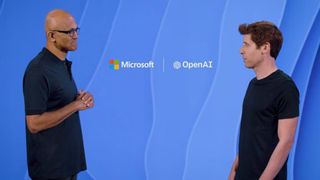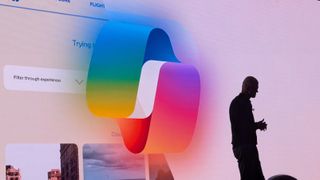Is Microsoft and OpenAI's tech bromance fraying? The ChatGPT maker's GPT-4 model is "too slow and expensive" to meet Copilot 365 users' needs.
Microsoft is reportedly looking beyond its partnership with OpenAI for help with its AI advances as Copilot 365 complaints mount.

Microsoft is OpenAI's largest investor with a $13 billion investment in the ChatGPT maker's technology, arguably the best bromance in tech. However, the multi-billion dollar partnership might be rocky grounds.
Earlier this year, Microsoft briefly became the world's most valuable company ahead of Apple and NVIDIA because of its early investment and adoption of AI across its tech stack. Microsoft has invested billions in OpenAI to facilitate its advanced and sophisticated advances. In return, the Redmond giant gets early access to next-gen AI models.
Most of Microsoft's products and services are powered by OpenAI's cutting-edge tech. However, a new report by Reuters suggests the company might have plans to integrate new models into its Microsoft 365 Copilot service. Perhaps more interestingly, Microsoft's new AI models won't be backed by OpenAI.
The report further details that Microsoft could be moving away from OpenAI's AI products like its GPT-4 model because it's too expensive and isn't fast enough to meet its enterprise customer's requirements. The report details how Microsoft is aggressively looking at ways to reduce costs for enterprise features, such as Github Copilot, with a goal of "passing on savings to customers."
This news comes after an earlier report indicated that Microsoft and OpenAI's partnership might be fraying, citing disagreements over their exclusive deal and the exorbitant sums of money on computing power that barely meets the requirements for OpenAI's AI advances.
Interestingly, OpenAI staffers say Microsoft's inability to meet the firm's computing power demand could potentially cost it the coveted AGI benchmark as rival AI labs rapidly progress in the landscape.
Microsoft's issues with Copilot 365

As you may know, Copilot 365 is deeply integrated into Microsoft's productivity tools, including PowerPoint and Word. It runs through the company's data and is designed to help users find information quickly. It also summarizes meetings and emails to enhance productivity, effectiveness, and efficiency.
Get the Windows Central Newsletter
All the latest news, reviews, and guides for Windows and Xbox diehards.
A recent report highlighted Microsoft's struggles with Copilot and its advanced AI models despite early access to OpenAI's tech. A high-ranking executive at Microsoft described most Copilot AI tools as "gimmicky," further disclosing that the firm heavily relies on third-party vendors to make Copilot work across its tech stack, including Microsoft 365. Some clients disclosed that the AI-powered tool doesn't work well "75% of the time," prompting some users to indicate that $30 per user per month is a bit extravagant.
OpenAI is reportedly attempting to scrap a stringent clause that will sever its partnership with Microsoft once it hits the coveted AGI benchmark. And as it seems, the ChatGPT maker's CEO Sam Altman indicated that AGI might be achieved sooner than anticipated and will whoosh by with surprisingly little societal impact. A technical employee at OpenAI claims the AI firm might have already achieved AGI after releasing OpenAI o1 to general availability.
Microsoft could be looking to place a safer bet on its AI advances. It might be a great idea for the tech giant to split its risks, especially after OpenAI's recent bankruptcy reports speculated to hit up to $5 billion in losses within 12 months. Microsoft CEO Satya Nadella indicated that severing its ties with OpenAI is the only natural cause of action after AGI is achieved.

Kevin Okemwa is a seasoned tech journalist based in Nairobi, Kenya with lots of experience covering the latest trends and developments in the industry at Windows Central. With a passion for innovation and a keen eye for detail, he has written for leading publications such as OnMSFT, MakeUseOf, and Windows Report, providing insightful analysis and breaking news on everything revolving around the Microsoft ecosystem. You'll also catch him occasionally contributing at iMore about Apple and AI. While AFK and not busy following the ever-emerging trends in tech, you can find him exploring the world or listening to music.
-
naddy69 Translation: The "AI" hype bubble is about to burst.Reply
Companies can only lose 5 billion dollars a year for a very short time. Once investors get tired of being duped/burned, it will be Good Night Gracie for "AI". -
fjtorres5591 It means MS has milked OpenAI for all it needed to boost its inhouse efforts and is getting ready to Spyglass them. Time to switch to models they don't have to share.Reply
It has always been in the cards. Either MS controls the tech or they ditch OpenAI and since a buyout is unlikely... -
fjtorres5591 Reply
Worth remembering that " People always overestimate the short term impact of a new tech and vastly underestimate the long term impact." -- Bill Gates.naddy69 said:Translation: The "AI" hype bubble is about to burst.
Companies can only lose 5 billion dollars a year for a very short time. Once investors get tired of being duped/burned, it will be Good Night Gracie for "AI".
So the much hyped "AI" hasn't put everybody out of work in two years?
It never was going to, pearl clutchers aside.
That said, wait a bit (say, five years) and you'll see what generative software leads to.
"The internet is just a fad." Luddites, Circa 1995. Hasn't aged well, has it? -
naddy69 "The internet is just a fad." Luddites, Circa 1995. Hasn't aged well, has it?Reply
I don't remember anyone saying that. Because computer networking was always a huge thing.
Sounds like something magazine/newspaper/encyclopedia publishers would say. Because they were scared. Like Polaroid when digital cameras came along.
In 5 years "AI" will be a quaint memory. Like "smart speakers" are today. Like "virtual reality" is today. Both of those were hyped just like "AI" was being hyped 2 years ago.
Real tech progress happens without hype. The IBM PC was laughed at in 1981. The Apple iPhone was also laughed at. Ditto the iPad. Unix was created to help manage the AT&T phone network.
Now PCs are The Standard. iPhones created the current HUGE mobile space. Unix now runs the world, running on everything from mainframes to PCs to all phones to watches.
All of these literally changed the world, and none were hyped AT ALL. -
fjtorres5591 Reply
Phones weren't hyped?naddy69 said:"The internet is just a fad." Luddites, Circa 1995. Hasn't aged well, has it?
I don't remember anyone saying that. Because computer networking was always a huge thing.
Sounds like something magazine/newspaper/encyclopedia publishers would say. Because they were scared. Like Polaroid when digital cameras came along.
In 5 years "AI" will be a quaint memory. Like "smart speakers" are today. Like "virtual reality" is today. Both of those were hyped just like "AI" was being hyped 2 years ago.
Real tech progress happens without hype. The IBM PC was laughed at in 1981. The Apple iPhone was also laughed at. Ditto the iPad. Unix was created to help manage the AT&T phone network.
Now PCs are The Standard. iPhones created the current HUGE mobile space. Unix now runs the world, running on everything from mainframes to PCs to all phones to watches.
All of these literally changed the world, and none were hyped AT ALL.
The entire post-PC narrative never happened?
You missed Steve Jobs dog and pony shows? The tech media hyping the latest and greatest Android flavor?
Oh, it happened. And it is still happening.
And so did the internet pooh-poohing.
Most of it came in and from the media that was losing its cash cow but it was a thing. And those are precisely the outfits leading the charge against generative software applications. For the same reason. Their ox is getting gored. Tough place to be. But as the old saying goes "When it';s time for railroads, the trains will roll." Entropy always wins.
All new tech is always attacked by entrenched powers seeing their cushy revenue streams being displaced. Just as true believers spread their "gospel" evangelizing the nirvana to come. The hype.
AI is no different.
Not. At. All.
The only new tech that isn't attacked is the one that is worthless. Looms were attacked. Cars were attacked. Microwaves were attacked Smartphones were attacked. And in many circles most are still attacked. The world changes and tech never stands still regardless of the inevitable naysayers.
As for internet speakers? Look again: the speakers are the product. The tech is voice assistants for consumer electronics. And on case you hadn't noticed, they're all over. Every Smart TV has the tech in its remote. Phones have it. And the tech is still evolving, adopting generative software and spreading to other products. It hasn't gone away and it's not going away.
And the speakers themselves are a $10B+ a year business and still growing. Projected to hit $20B by 2030. No, they did not set the world on fire, but have you noticed the withering of home sound systems and boom boxes? Connected speakers have eaten the low end of both markets as audio subscriptions have displaced a good chunk of physical media and even digital sales.
The things are so ubiquitous nobody pays attention but they're there just like can openers and microwave overs. And that is *exactly* what happens with successful techs and products: the evangelists win and go home.
When people stop arguing over "AI" generative software it won't be because the hype is over, it will be because there is no more point in debating the fait accompli. It will be embedded everywhere just like the internet.